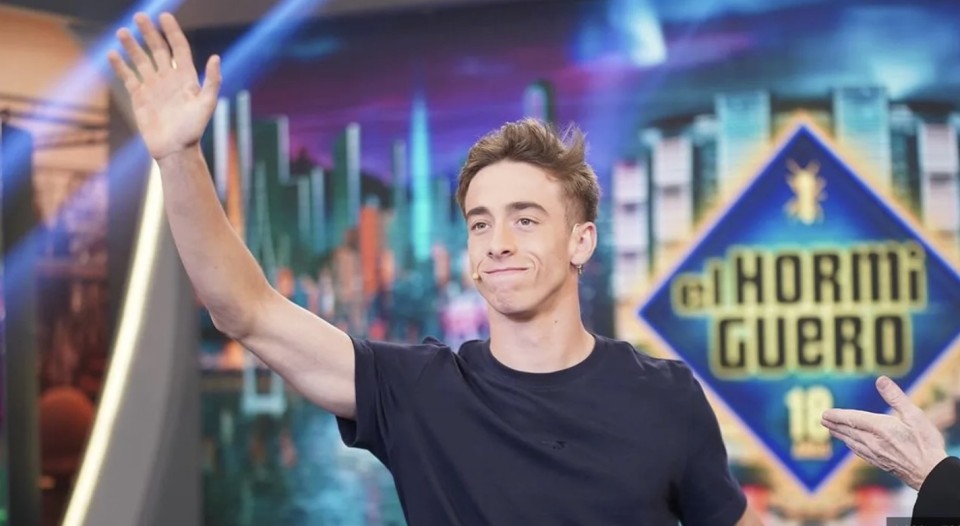Acosta's arrival in the MotoGP didn't disappoint expectations, bringing a breath of change and impetuousness that was frankly needed. Everyone knew that the Spanish rider, fresh from his Moto2 title, had boundless talent, and so did the other riders on the grid. But it wasn't that obvious that the rider from Mazarrón would be so competitive from the early stages of the championship. Of course, KTM made significant strides. And, on the Qatar circuit, where they had tested, the numbers could've been distorted to some extent, which left the benefit of the doubt. A doubt that was, however, largely dispelled in Portimão, where Acosta achieved his best result in a very short time, a third step on the podium behind two of the best Ducatis, while also overtaking riders such as Marquez and Bagnaia, therefore, confirming himself as the best KTM on the track. Once again, the Mattighofen-based constructor demonstrated that it played its cards well.
Pedro Acosta was a guest Tuesday night at Antena 3 during the program "El Hormiguero," where he retraced his debut in the premier class on the GasGas team. They touched on many topics, from the overtake that enlivened the competition in Portimão to the expectations for this first season in the MotoGP.
The impact with the MotoGP is never easy for a rookie, but Pedro was competitive from the very start.
"In Qatar, in the FP1, I did a good save," Acosta said. "Was it luck or skill? You need both. The brake lever guard had come off, and I lost my grip, but it was fun," he said laughing. "When I got on this bike, I realized I had to lean even more. In recent years, the bikes have evolved so much that you can ride really close to the ground. In recent years, I've fallen less, but there are many ways to fall. The best is sliding away. In the race, it's different than in tests. If you're in the lead and you set your pace, you're fine. The problem is when you're behind and you have to overtake. You're always at risk in every overtake. But that's the great thing about motorcycles. In cars, you go off the road. You spin. But you hurt yourself here. It's like looking death in the face and seeing who's the biggest chicken."
In Portimão, the rider from Spain put on a show with a series of overtakes, primarily those on Marquez and Bagnaia.
"It looks easier on TV," he said jokingly. "Marquez did it with Rossi, and now it's my turn to do it with him. But you have to have the balls (ed. for those overtakes)," he continued, jokingly. "It was my first real race in the MotoGP. They told me in the pits that I had to grow some balls, and that's what I did."
In today's MotoGP, overtaking has also become more difficult because of aerodynamics.
"I think I did well. Now I'm more delicate. We touch, and it seems like it's a bad thing. I usually don't touch. I hit directly," he joked, again. "In my three years, I've never been to race direction for having made someone fall, but there's always a possibility. I get excited when I get overtaken, and I always try to put on a show for those watching from home as well."
It's been a lighting quick career for Pedro, from his leg injury in 2022 to his Moto2 title last year.
"Sometimes, you forget quickly. When you win a world championship, you remember more of the bad moments, but it's worth it in the end. In 2022, I fractured my femur, and I think that saved me from a lot of things. At the time, I was kind of crazy and needed to calm down. I really hurt myself. I lived three years with that team and, leaving those people, those relationships, wasn't easy. I told them that, in three years, they had never seen me cry, but they would see tears that day."
With talent also comes expectations and comparisons, and Pedro wants to make it clear that he's only thinking about his own course.
"I think I'm the new Pedro Acosta. I arrived in the world championship at the very young age of sixteen, and something has changed since then. The first year, I did well, but the second year I didn't. I had difficulty adapting to the bike. Now, I'm a different rider. Before, I was breaking bikes at a pace that wasn't normal. I don't know how to define myself as a rider, but I have fun, and I'm paid to do what I do. What more could I want?"
The road to success isn't just talent but also obsession, ego, and a dash of humility.
"I can watch four or five races a day. The easiest thing in life is to copy. If you learn by watching the best, you do the same. I make a selection though. I only watch the races that really interest me. I also have a big ego. I go on YouTube and watch my videos. But I also owe a lot to my parents. If they hadn't done all this, risking home and job, I might not be here now but fishing with my father."
The rider from Spain finally discussed his own expectations for the continuation of the season.
"I have no real expectations. All the ones that will come will be unreal. Everything will be a test, and we'll have to be calm. But, hopefully, everything will go as well as it is now."









